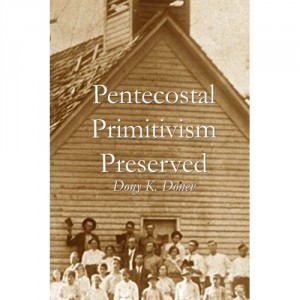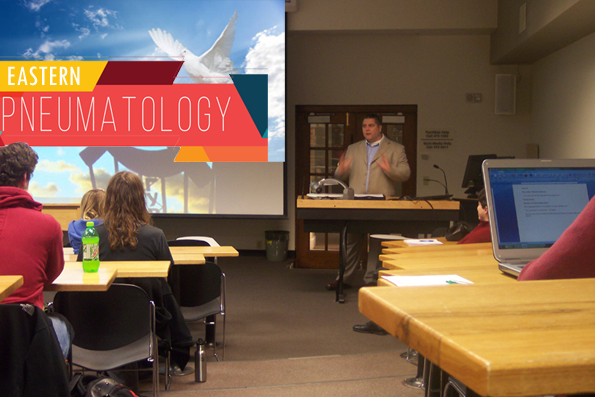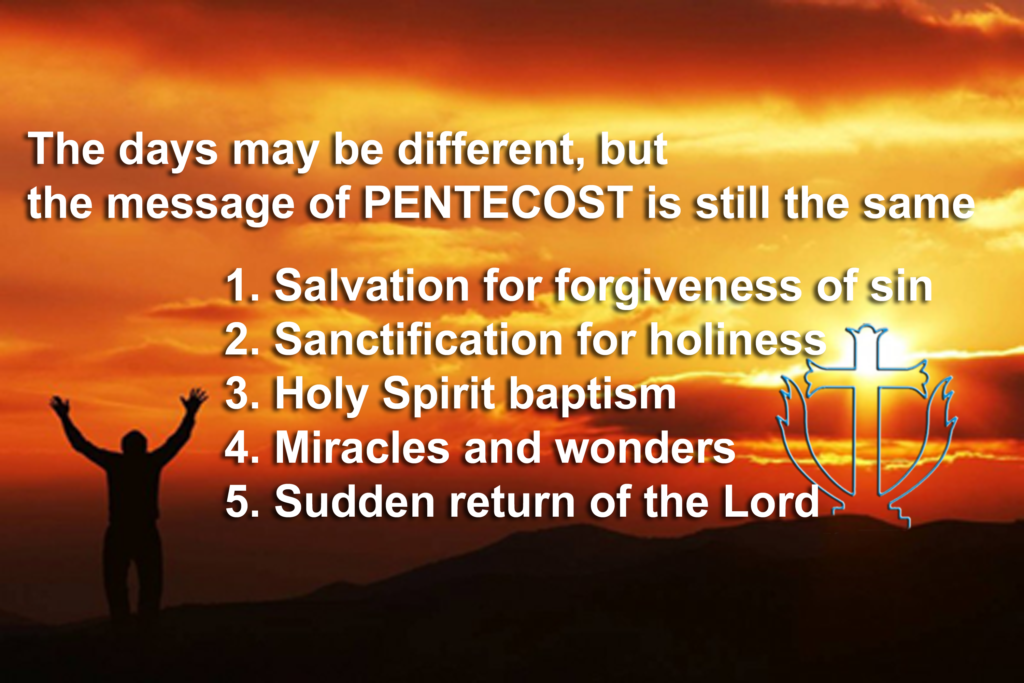Back to the Basics of Pentecost
 Since the beginning of the 21st century, only 6-10% of new born believers in America receive the Baptism with the Holy Spirit, which by 2018 has resulted in:
Since the beginning of the 21st century, only 6-10% of new born believers in America receive the Baptism with the Holy Spirit, which by 2018 has resulted in:
- Over 60% within Global Pentecostalism do not speak in tongues
- A major doctrinal shift within Pentecostal Theology today claims speaking in tongues is not the only evidence of Holy Spirit Baptism
- Some theologians even claim there is no initial evidence in the Bible
- Others today go further to believe that no outward sign of the Holy Spirit baptism is necessary.
For this reason, WE are re-committing ourselves and ministry to revival and restoration of the Pentecostal Message through praying, fasting and preaching:
- Salvation of the sinner’s soul and entire sanctification through the Blood of Jesus
- Baptism with the Holy Spirit and fire with initial evidence of speaking in tongues
- Supernatural gifts and ministries of the Holy Spirit
- Healing, deliverance and signs following
- Pre-Millennial return of Christ and pre-Tribulation Rapture of His Church to glory
Please consider the URGENCY of this generation!
Let us reason together what can we do to prevent this rapid decline in Biblical spirituality.
Revival will not come without preaching!
Revival of Pentecost will not come without preaching the Message of Pentecost.
The message of PENTECOST is still the same…
February 10, 2023 by Cup&Cross
Filed under 365, Featured, News, Publication
Since the beginning of the 21st century, only 6-10% of new born believers in America receive the Baptism with the Holy Spirit, which by 2018 has resulted in:
- Over 60% within Global Pentecostalism do not speak in tongues
- A major doctrinal shift within Pentecostal Theology today claims speaking in tongues is not the only evidence of Holy Spirit Baptism
- Some theologians even claim there is no initial evidence in the Bible
- Others today go further to believe that no outward sign of the Holy Spirit baptism is necessary.
For this reason, WE are re-committing ourselves and ministry to revival and restoration of the Pentecostal Message through praying, fasting and preaching:
- Salvation of the sinner’s soul and entire sanctification through the Blood of Jesus
- Baptism with the Holy Spirit and fire with initial evidence of speaking in tongues
- Supernatural gifts and ministries of the Holy Spirit
- Healing, deliverance and signs following
- Pre-Millennial return of Christ and pre-Tribulation Rapture of His Church to glory
Please consider the URGENCY of this generation!
Let us reason together what can we do to prevent this rapid decline in Biblical spirituality.
Revival will not come without preaching!
Revival of Pentecost will not come without preaching the Message of Pentecost.
Speaking in Tongues in America Prior to the Azusa Street Revival of 1906
April, 1906 – The Azusa street revival swept the globe starting with California
January 1, 1901– The initial phenomenon of speaking in tongues occurred at Parham’s school in Topeka, Kansas
January 6, 1900 – Frank Sanford’s Shiloh school reported that “The gift of tongues has descended”
1896 – Over 100 people baptized in the Shaerer schoolhouse revival conducted by the Christian Union in the North Carolina mountains
1887 – People falling in trances and speaking in tongues were reported at Maria Etter’s revival meetings in Indiana
1874 – Speaking in tongues occurred during healing meetings reported in New York
1873 – William H. Doughty and the Gift People of Rhode Island spoke in tongues
1854 – V. P. Simmons and Robert Boyd reported tongue speaking during Moody’s meetings

FURTHER READING:
Church of God (Cleveland, TN)
- Alive, alive! (A personal testimony)
- Church of God Primitivism
- Bulgarian Church of God
- J.W. Buckalew
- Why revival came? by Dr. Charles Conn
Azusa Street Revival of 1906
- Lucy F. Farrow: The Forgotten Apostle of Azusa
- The FORGOTTEN ROOTS OF THE AZUSA STREET REVIVAL
- Azusa Street’s Apostolic Faith Renewed
- Azusa Street Sermons
- Pentecostal Primitivism Preserved
Prior to Azusa Street Revival of 1906
- First person to speak in tongues in the Assemblies of God was William Jethro Walthall of the Holiness Baptist Churches of Southwestern Arkansas
- The Work of the Spirit in Rhode Island (1874-75)
- Speaking in Tongues in America Prior to the Azusa Street Revival
- WAR ON THE SAINTS: Revival Dawn and the Baptism of the Spirit
- How Jezebel Killed One of the Greatest Revivals Ever
Fulfilling the Great Commission by 2033?
Dr. Billy Wilson and Dr. Rick Warren hold ‘2033 Leaders Consultation’
NEW YORK — More than two dozen ministry leaders of significant global networks convened Dec. 5-6 in New York City to combine their experience and insights toward the goal of Great Commission fulfillment within the next decade.
Hosted by Dr. Billy Wilson, Oral Roberts University President, Pentecostal World Fellowship Chair and Empowered21 Global Chair, and Dr. Rick Warren, Executive Director of Finishing the Task and Founding Pastor of Saddleback Church, the event brought the leaders representing significant denominations, para-church networks and evangelistic ministries from around the world together for prayer, connection and collaboration.
“I believe we are entering the most important decade of Great Commission effort in the history of the church,” shared Dr. Wilson. “Numerous 2033 initiatives were represented in this consultation and it was a joy to witness our shared passion and unity across the diversity of the body of Christ. The next decade is going to be amazing as we push together toward providing everyone on planet earth the opportunity to know Jesus as their savior.”
The two-day meeting ended with the development of a commitment document agreeing to significant efforts over the next decade, including collaborating with one another, praying for the salvation of others, mobilizing followers of Jesus to join in the efforts, investing increased resources for evangelism and going with the good news to the ends of the earth.
“In our polarized world, it’s easy to erect walls and go it alone with just your own tribe,” noted Warren. “It takes courage to build bridges to others who love Jesus but don’t believe or practice the faith in the same way you do. On Dec. 5, as I listened and watched a small group of 24 influential Christian leaders, representing a wide spectrum of the Body of Christ, step out of their comfort zones in order to begin collaborating to complete the Great Commission, I sensed that God was smiling from Heaven. He had found a group of people willing to be an answer to Jesus’ prayer for the unity of His church that He prayed in the Garden of Gethsemane the night before He was crucified.”
The group plans to convene again at , a three-day conference and one-day stadium event hosted by Empowered21 on June 21-24, 2023 at Amsterdam RAI & Olympic Stadium. The international event will feature influential leaders and powerful speakers to launch a decade of unprecedented evangelism to get the gospel to every person on earth by 2033. For more information, visit amsterdam2023.com.
Represented Organizations
The following organizations and ministries were represented at the Dec. 5-6 event:
- Brian Alarid, America Prays & World Prays
- Doug Beacham, International Pentecostal Holiness Church
- Keith Boyette, Global Methodist Church
- Henry Cappello, Global 2033
- Samuel Chiang, World Evangelical Alliance
- Doug Clay, Assemblies of God
- Dick Eastman, Every Home for Christ
- Oliver Fleury, Jesus Celebration 2033
- Mart Green, Hobby Lobby
- Bobby Gruenewald, YouVersion
- Tim Harlow, National Association of Christian Churches
- Alan Hawkins, Anglican Church in North America
- Rob Hoskins, OneHope
- James Hwang, Billion Soul Harvest
- Young Cho, Billion Soul Harvest
- Everton Jackson, Baptist World Alliance
- Werner Nachtigal, GO Movement
- Michael Oh, Lausanne Movement
- Nick Perryman, Alpha
- Thomas Schirrmacher, World Evangelical Alliance
- Rick Warren, Finishing the Task
- David Wells, Pentecostal Assemblies of Canada
- Michael White, Rebuilt Parish / Church of the Nativity
- Billy Wilson, ORU and Empowered21
- Caleb Wehrli, Empowered21
- Ashley Wilson, Empowered21
Participating Leader Quotes
“After our meeting, the World Evangelical Alliance is even more committed to ‘2033.’ It was a great meeting of collaboration, planning and global leaders becoming friends for the gospel’s sake.” — Thomas Schirrmacher, Secretary General, World Evangelical Alliance
“The rising global generation is perhaps the most cause-oriented generation in the history of the world. This call and clear statement from the leadership of the global Church to reach everyone in the world with the love, truth and power of Jesus is going to be incredibly appealing for a decade of unprecedented evangelism.” — Rob Hoskins, President, OneHope
“It’s inspiring and exciting to be part of a coalition across global Christianity focusing on global evangelism by the year 2033. The spirit of prayer and unity is palpable.” — Doug Beacham, Superintendent, International Pentecostal Holiness Church
“I was inspired and envisioned by the unity amongst all Christian leaders and the commitment to engage and collaborate to finish the task of the Great Commission. This is the beginning of a new era, with an incredible momentum, through which every person can be reached with the Gospel message.” — Henry Cappello, International Director, Global 2033
“Imagine that we live in a time when it is possible to reach the whole world with the Gospel. We’re excited to call the Church to join us for this incredible decade of evangelism.” — Werner Nachtigal, Founder, GO Movement
“What an amazing privilege to meet with global leaders passionate about accelerating the fulfillment of the Great Commission. We have a unique opportunity to unite across the Christian church to ensure that every person hears and has an opportunity to hear and respond to the Gospel of Jesus Christ” — Keith Boyette, Connectional Officer, Global Methodist Church
“What a historic meeting of like-minded Global leaders gathered around Jesus for the biggest push ever for the Great Commission. The Ecclesia has the best Good News ever told. And this broken world desperately needs hope at a geo-politic level and transformation at a personal level. A powerful united Global Momentum has begun.”
— Olivier Fleury, Founder and President, JC2033
“The call towards collaboration of the body of Christ to reach 8 billion is an exciting and encouraging opportunity for the Global Church. This is a crucial, historic, unprecedented work of God.” — Bishop Alan Hawkins, Chief Operating Officer, The Anglican Church in North America.
About Empowered21
Empowered21 is a global Spirit-filled movement working to connect the generations for blessing, impartation and a fresh outpouring of the Holy Spirit in the 21st century. Its U.S. office is on the campus of Oral Roberts University, of which Empowered21 Global Chair Dr. Billy Wilson is president. To learn more, visit empowered21.com.
13 Years of Chaplaincy on the High Seas
 We began our literal journey of ministry on the high seas in 2009. After exploring the opportunity for several years’ prior and submitting applications to various chaplaincy organizations which dealt with such ministry, the doors finally opened for Cup and Cross.
We began our literal journey of ministry on the high seas in 2009. After exploring the opportunity for several years’ prior and submitting applications to various chaplaincy organizations which dealt with such ministry, the doors finally opened for Cup and Cross.
This search for a ministerial identity and its proper application in the real world coincided with the start of the Master’s in Chaplaincy Ministry Program which we designed for the Bulgarian Evangelical Theological Institute in Sofia around 2008-2009. The long standing relationships with professors, active military chaplains from various fields and countries, and the wisdom of several Generals in the field helped us calibrate our ministry focus with what is needed by real people in the real world.
The new fad “to be real” is not enough in a realistic ministry setting. When 25ft. high storm waves beat the aft and the ship is thrown towards the dark wall of ocean waters ahead, one cannot help but “to be real” and depend on a very real and skilled crew. A captain alone cannot run the boat through a storm even if all systems are reported working. It is the crew deep down in the engine room and making its way on the slippery deck that makes it all happen.
The Crew. Some of them have not seen their families for months or even a year at times. They struggle with the same fears and anxieties as the rest of us. Except, while the rest of us can hold on to something for dear life, the crew is obligated by duty to continue to serve and move the boat ahead. The little chapel on the top deck becomes a passage to a lagoon past the riffs of stormy life where stories are shared, prayers are lifted up together and human lives are reclaimed anew for Heaven.
We have found these nontraditional paths of travel and ministry yielding the most unique encounters and connections for Kingdom growth. Our family is thankful for these 10 years and looking forward to even more means of ministry outside of the four church walls. If you would like for us to come to your church as share our journey feel free to reach out to us.
Bulgarian Evangelical Churches in the European Union (2022 Report)
- Bulgarian Evangelical Churches in Germany
- Bulgarian Evangelical Churches in Spain
- Bulgarian Evangelical Churches in England
- Bulgarian Evangelical Churches in France
- Bulgarian Evangelical Churches in Belgium
- Bulgarian Evangelical Churches in Italy
- Bulgarian Evangelical Churches in Cyprus
- Bulgarian Evangelical Churches in Crete
READ MORE:
- First Bulgarian Church in Chicago Opened in 1907
- Gateway Cities for Bulgarian Evangelical Churches
- How to Start a Bulgarian Church in America from A-to-Z
- Unrealized Spiritual Harvest as a Paradigm for Cross-Cultural Ministries among Migrant and Disfranchised Ethnic Groups in America Today
Not paying attention to the person
Leaders not attuned to the needs of the market will fail. As the old saying goes, if you’re not taking care of your customers, someone else will be more than happy to. Successful leaders focus on the consumer experience, which in turn leads to satisfaction and loyalty. The best leaders find ways to consistently engage the consumer and incorporate them into their innovation and planning initiatives. If you ignore, mistreat, or otherwise don’t value your customer base, your days as a leader are most certainly numbered.
The “A” word: Real leaders are accountable
Real leaders are accountable. They don’t blame others, don’t claim credit for the success of their team, but always accept responsibility for failures that occur on their watch. Most of all, leaders are accountable to their team. I’ve always said that leaders not accountable to their people will eventually be held accountable by their people.
Beware the know-it-all leaders
The best leaders are acutely aware of how much they don’t know. They have no need to be the smartest person in the room, but have the unyielding desire to learn from others. I’ve often said, leaders who are not growing cannot lead a growing enterprise. One of the hallmarks of great leaders is their insatiable curiosity. If a leader isn’t extremely curious about every aspect of their organization, trust me when I say there are huge problems on the horizon.
The Non-Chalcedonian Eastern Church: West Syrian (Jacobite)

Dony K. Donev, D.Min.: Eastern Pneumotology Lectures
Eastern Orthodoxy can be expressed in one word: theism. The purpose and meaning of life is to become more like God. Deification is pursued by all means of human existence. This quest for divine likeness often includes the typical for the Eastern Church, speculation on the divinity and humanity of Christ, traditions on the doctrine of the Trinity and non-traditional mystical experiences. They appear in the context of both physical and spiritual characteristics in individual and corporate ecclesiastical environment. The role of the Spirit in the process of deification is threefold and involves: creation, re-creation and theism. Eastern Pneumotology follows the graduate process of theism development. The Spirit is involved in the original creation of the world as well as the new-birth experience. His work however, does not end there, but continues throughout the process of personal deification of the believer.
The Non-Chalcedonian Eastern Church: West Syrian (Jacobite)
The Jacobites viewed the presence of the Holy Spirit in three prime settings. Firstly, He is the agent of the original ex-nahilo creation and the spiritual re-creation in the second birth. Secondly, He is present in the baptism and chrismation. Lastly, He is the Transfigurator of the Eucharistic elements representing the body and the blood of Christ.5 [1]
Our prime source of information on the corporate ecclesiastical Coptic tradition is a document entitled The Odes of Solomon. Interesting to notice in this context of this writings is the fact that the Spirit is referred in a feminine gender.[2] However, this conception declined as the devotion to the person of Mary grew.[3]
Such a devotion is extraordinary noticeable in the life and writings of Ephrem the Syrian (ca. 306-373). He further compares the coming of the Holy Spirit upon Mary as the Spirit’s descent over both the water baptism and the elements of the Eucharist.[4] This is why in the Syriac baptismal service; the holy oil is powered onto the water.[5] For the same reason, Ephrem states that the Eucharist means involvement with the hosts of heaven.
Ephrem recognizes Spirit-activity through the entire panorama of salvation. The Spirit is present in the transformation of the fallen human creature into “the pristine of paradisiacal state.”[6] The gift of the Spirit is received in the water baptism where the believer receives a divine armor.[7]
A follower of Ephrem is Philoxenus of Mabbug (ca. 440-523). Among other issues, in his writings, he states that the life in the spirit is nothing else but a process of sanctification. He refers to it also as the spiritualization of the body, which is expressed through the domination of the body by the soul. The above results are possible only after fasting and prayer.[8] A contemporary of Philoxenus by the name of Severus of Antioch (ca. 465-ca. 539) adds to the above process the presence of the gifts of the Holy Spirit in the church as a sign of God’s divine election. In this sense, the Jacobites are carriers of the already-not-yet idea.[9]
[1] J. H. Barnard, The Odes of Solomon, Texts and Studies 8:3 (Cambridge: Cambridge University Press, 1912), 120-21.
[2] Ibid., 67, note on verse 17.
[3] Robert Murray, “Mary, the Second Eve in the Early Syriac Fathers,” Eastern Church Review 3:4 (Autumn 1971): 373.
[4] Ephrem, Nisibene Hymns 37.4 in CSCO 241, Syr. 103:13, and NPF 2nd Series 13:295.
[5] Ephrem, Hymns of Paradise 11, in CSCO 175, Syr. 79:43-46.
[6] Jean Danielou, From Shadows to Reality (Westminster: The Newman Press, 1960), 23-30.
[7] Ephrem, Hymns of the Epiphany 3.1-3, in CSCO 187, Syr. 83:18-19.
[8] E. A. Wallis Budge, The Discourses of Philoxenus, Bishop of Mabbogh, AD 485-519 (London: Asher and Co., 1894), “Eleventh Discourse on Assistance,” Budge 264.
[9] Burgess, 178.
God as to Water: The Musing Continues
October 15, 2022 by Cup&Cross
Filed under News, Publication, Research
by Kathryn Donev, LPC-MHSP, NCC

and His voice was like a noise of many waters: and the earth shined with his glory – Ezek 43:1-7
In the beginning of 2011, thoughts began flooding my awareness about “God as to Water”. Scripture after the next along with revelation came in one instant supported by many questions from loved ones during this period while on the territory of Eastern Europe. Overwhelmed by the ruminations, on July 5, 2011 the topic was dismissed along with written works. In 2022 on July 5, while in North America, the ponderings proceeded. I begin looking for the article which I convinced myself was written over a decade ago, but to no avail. Only disjointed insights were jotted down on paper. The following attempts to expand on something that is far beyond comprehension.
If in the beginning was the Word and the Word was with God and the Word was God, then God or the Word was always in existence and all things came from this. Everything was made from Him. He, God, giving of Himself, created the Heavens and the Earth. But this “Earth” was formless, but deep, empty and dark. All while God’s Spirit hovered over the waters, plural. One could imagine this as an omnipresent being floating ever connectedly to the essence of wholeness. Then, division came, but it came only from that which was in the beginning – the Word, God.
Separation of entities occurred; light from darkness for us to see the vault that separated water from water? Splitting water from itself? Electrolysis that happen with an energy input so great that perhaps came with a sound of a mighty rushing wind or sonic boom? With this endothermic reaction, hydrogen stands alone.
Everything in the Universe is made up of matter and energy. Einstein said that “Energy cannot be created or destroyed; it can only be changed from one form to another.” The world depends on energy to provide for all humankind activities. Hydrogen is the base element of our physical universe. All elements and matter can be created from or broken down to hydrogen. That which came from water. The atom in water that is surrounded by hydrogen is oxygen; the element of breath needed to support all flesh on the earth just as God supports all life by His Spirit. The water on our Earth today is the same water that it has always been. No new water has been created. Water is the only element that exists on our planet in a solid, liquid and gaseous aggregate state reminding of the Trinity. The molecules of water are self-attractive. They are drawn to each other to support things. This characteristic of water assists in capillary action.
If it was only God in the beginning then could God perhaps be energetic water; formless, but with infinite depth. Being ever presents in everything. There are over 700 references to water in the Bible and many of these refer to God, in some way as that water. At times He is even referred to a cloud or mist attempting to label His Glory.
and the house was filled with the cloud, and the court was full of the brightness of the LORD’S glory. – Ezek 10:4
In Genesis chapter six, God chose to use water as the means of destroying a sin-cursed world. Thus water became a “dividing line” between the cleansed and the uncleansed. When God delivered the children of Israel from Egyptian bondage, he led them to the Red Sea. They were immersed in cloud and sea and there was freedom (1 Cor. 10:1-f). When Jesus healed the man born blind (John:1-f) he used water in the form of saliva as the “dividing line” between blindness and sight. Water is a universal solvent having the ability to cleanse. It can dissolve even gas and can recycle chemicals. There is life in water, without is death. It is mention in every chapter of the 4th Gospel.
“Everyone who drinks this water will be thirsty again, but whoever drinks the water I give them will never thirst. Indeed, the water I give them will become in them a spring of water welling up to eternal life.”
-John 4:13-14
And the musings continue….










